

Poids : quand les bactéries nous font grossir Nous sommes tous inégaux face aux kilos en trop.
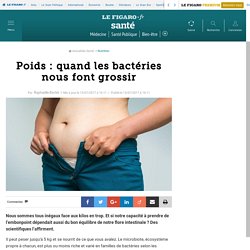
Et si notre capacité à prendre de l’embonpoint dépendait aussi du bon équilibre de notre flore intestinale ? Comment améliorer l’efficacité des probiotiques ? Les probiotiques sont des microbes vivants – principalement des bactéries – qui, lorsqu’ils sont ingérés en quantité adéquate, peuvent avoir des effets bénéfiques sur la santé.

Certains aliments, comme les yaourts, en contiennent. Theconversation. « Les gros n’ont qu’à moins manger et s’activer un peu plus pour perdre du poids ».

Cette phrase, on l’a déjà tous entendue. Est-ce si simple ? Des études scientifiques montrent que la suralimentation ainsi que la consommation de plats trop riches en graisses (lipides) et en sucres (glucides) provoquent des modifications au niveau du cerveau. La fonction neuronale impliquée dans la régulation de la prise alimentaire est alors altérée. Un cercle vicieux se crée dont les trois composantes majeures sont malbouffe, fonction neuronale détériorée et sensation de satiété dérégulée. Une pandémie d’obésité Une étude très récente, publiée par la prestigieuse revue médicale New England Journal of Medicine, révèle que 12 % de la population mondiale est obèse, et qu’un homme sur trois est en surpoids ! La France se démarque en comptabilisant notamment 44 % d’hommes en surpoids ! La leptine : notre coupe-faim naturel. Does Drinking Alcohol Kill Gut Bacteria?
A Molecule to Treat Obesity? Crystal structure of a new engineered protein for treating obesity in laboratory animals.
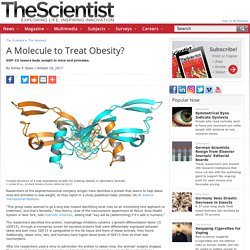
Y. XIONG ET AL., SCIENCE TRANSLATIONAL MEDICINE (2017)Researchers at the biopharmaceutical company Amgen have identified a protein that seems to help obese mice and primates to lose weight, as they report in a study published today (October 18) in Science Translational Medicine. Gut fungi might be linked to obesity and inflammatory bowel disorders. 11 aliments riches en probiotiques excellents pour votre santé - Therapeutes magazine.
Les probiotiques sont des micro-organismes apportant de nombreux bienfaits une fois consommés (1).

Ce sont le plus souvent des bactéries bénéfiques occupant une fonction particulière dans le corps. 99% of The Microbes in Our Own Bodies Are Still a Total Mystery to Science. 99 Percent We’re seeing incredible scientific discoveries being made every day, but new research indicates there’s a pretty huge gap in our knowledge when it comes to our own bodies – it turns out more than 99 percent of the microbes inside us are currently unknown to science.
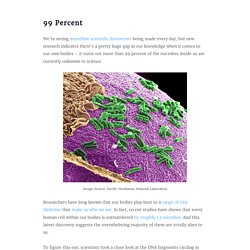
Ancient Gut Genetic Core Program Finding May Lead to New Digestive Disease Therapies. Scientists from the Duke University School of Medicine say they have found a set of genes and regulatory elements in the intestinal lining that has stayed the same from fish to humans.

They note that a good number of these genes are linked to human diseases, including inflammatory bowel disorders, diabetes, and obesity. The research ("Genomic Dissection of Conserved Transcriptional Regulation in Intestinal Epithelial Cells"), which appears in PLOS Biology, marks fish as a model organism for studying how this old genetic information (covering over 420 million years of evolution) controls the development and dysfunction of the intestine.
"The intestinal epithelium serves critical physiologic functions that are shared among all vertebrates. However, it is unknown how the transcriptional regulatory mechanisms underlying these functions have changed over the course of vertebrate evolution. CRISPR Gene Therapy via Skin Grafts Treats Obesity and Diabetes in Mice. Researchers edited skin stem cells from newborn mice using CRISPR-based technology so that the cells secreted a peptide that regulates blood sugar.

Transplanting the cells onto mice showed the grafts increased insulin secretion and reversed weight gain from a high-fat diet, as well as overturned insulin resistance. The result is a small step toward developing a safe and durable gene therapy to treat diabetes in humans. “We’ve had this idea for a long time, so it’s exciting to see that, indeed, it can work to deliver therapeutics,” coauthor Xiaoyang Wu, a stem cell biologist at the University of Chicago, tells GEN. In the study, Wu and colleagues worked with skin because it is a large organ and easily accessible. Researchers Produce World's First Probiotic Beer.
As if anyone needed any excuse to drink more beer, a team of researchers have managed to produce an alcoholic beverage that also contains probiotics.
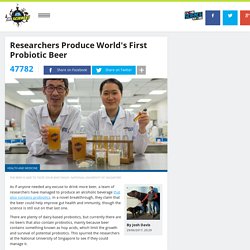
In a novel breakthrough, they claim that the beer could help improve gut health and immunity, though the science is still out on that last one. There are plenty of dairy-based probiotics, but currently there are no beers that also contain probiotics, mainly because beer contains something known as hop acids, which limit the growth and survival of potential probiotics. The Venus Project. The Venus Project, Inc (Le Projet Venus), est une société américaine qui promeut le système d’Économie Basée sur les Ressources (EBR) tel qu'inventé par Jacque Fresco[1], un système où l'humanité vivrait en harmonie sociale et environnementale grâce à la technologie et à l'application de la méthode scientifique. TSRI Scientists Find Brain Hormone that Triggers Fat Burning Trending. LA JOLLA, CA – January 27, 2017 – Biologists at The Scripps Research Institute (TSRI) have identified a brain hormone that appears to trigger fat burning in the gut.
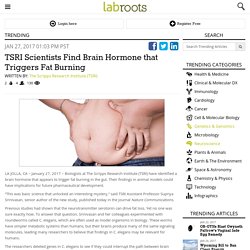
Their findings in animal models could have implications for future pharmaceutical development. “This was basic science that unlocked an interesting mystery,” said TSRI Assistant Professor Supriya Srinivasan, senior author of the new study, published today in the journal Nature Communications. Previous studies had shown that the neurotransmitter serotonin can drive fat loss.
Yet no one was sure exactly how. To answer that question, Srinivasan and her colleagues experimented with roundworms called C. elegans, which are often used as model organisms in biology. Four Common Myths About Exercise And Weight Loss. It’s that time of year when many are trying, and some are failing, to live up to their New Years' resolution of losing weight. Many of these probably include resolutions to be more physically active in striving for this goal. But first, there are some common misconceptions about exercise and weight loss that need to be addressed. Myth 1. Exercise vs Diet. Which Diets Actually Work? Breast-Feeding the Microbiome. This is an edited excerpt from “I Contain Multitudes: The Microbes Within Us and a Grander View of Life,” which will be published on August 9th by Ecco, an imprint of HarperCollins Publishers. The Foods for Health Institute, at the University of California, Davis, has the appearance of a Tuscan villa, its terra-cotta-walled buildings overlooking a large vineyard and a garden that bursts with summer vegetables.
It is led by a chemist named Bruce German, and if there were a world title in extolling the virtues of milk he would surely hold it. At our first meeting, he spent half an hour monologuing on the subject, bouncing on an exercise ball and kneading a tattered shred of bubble wrap as he spoke. Milk, he said, is a perfect source of nutrition, a superfood that is actually worthy of the label. This isn’t a common view. Milk is a mammalian innovation, common to platypuses and pangolins, humans and hippos, its ingredients varying according to what each species needs. Can your biome make you fat? Emily Pidgeon/TED Is there a correlation between your biome and your BMI? In her new book, Why Diets Make Us Fat, neuroscientist Sandra Aamodt sheds light on this tangled, cryptic relationship.
There seems to be little doubt that the diet book of 2016 is Sandra Aamodt’s Why Diets Make Us Fat: The Unintended Consequences of Our Obsession with Weight Loss — it’s already been a cover story in the New York Times Sunday Review. ?articles. Changes in diet can cause gut microbes to produce acetate, which in turn stimulates insulin secretion and obesity in rodents, scientists show. WIKIMEDIA, ORNLSeveral studies have linked changes in the gut microbiome to obesity, insulin resistance, and metabolic syndrome, but the details of the link have been unclear. Now, a team led by researchers at Yale University has uncovered one pathway leading from gut microbes to increased food intake and insulin secretion in rodents, pointing to potential therapeutic targets for obesity in humans.
The findings were published earlier this week (June 8) in Nature. Will Pills Containing Fecal Matter Help Treat Obesity? Healthy guts burn more calories during sleepTrending. An unhealthy shift in your gut microbes might cause you to gain weight by changing how many calories you burn while you sleep, a new study with mice suggests. "It's about a 16 percent change in resting metabolic rate, which is enormous," says Justin Grobe. "It would be 29 pounds of fat gained every year for an average human. " Image Credit: Yannig Van de Wouwer/Flickr. Hibernating Bear Microbiome May Hold the Key to Combating Obesity. Gorging oneself on high-calorie food to pack on fat only to fall asleep for a few months and have it all melt away isn’t the latest diet fad (at least not yet), but it is a regular part of life for bears as they prepare to hibernate for the winter.
Yet, despite the rapid weight gain, the animals somehow avoid the health consequences so often associated with obesity in humans. Researchers at the University of Gothenburg in Sweden have published results from a study wherein they show that bears' shifting metabolic status is associated with significant changes in their gut microbes. Poop Pills Investigated As Obesity Treatment. Could an exchange of poop from a slim person help an obese individual lose weight? We could soon find out, as scientists in the U.S. are embarking on a clinical trial to find out whether so called “fecal microbiota transplantation” (FMT) can aid weight loss. Hearing the term “fecal transplant” may leave you with some tense glute muscles, and yes, the procedure can involve exactly what you’re thinking (a poop enema, in case you’re unimaginative).
But this upcoming trial, led by Dr. Elaine Yu from Massachusetts General Hospital, will involve taking freeze-dried poop that’s been popped in a pill. We’ll let you decide which is the lesser of these two evils. There is, of course, method behind the madness. A few years ago, scientists looked at pairs of twin mice that were discordant for obesity, meaning that one was lean while the other was overweight.
That’s perhaps not the strangest story, though. [H/T: Ars Technica] Fish oil turns fat-storage cells into fat-burning cells in mice, study finds. ?articles. “This paper, which had nicely controlled conditions, demonstrated that type of fat is really important for shaping microbial communities and their functional dynamics, which in turn impact our health,” said Vanessa Leone, a postdoc studying host-microbe interactions at the University of Chicago who was not involved in the study.
Thunder God Vine Extract Makes Obese Mice Rapidly Shed The Pounds. A Drug that can Beat Obesity?Trending. Obesity has long been a global epidemic with an estimated 2.8 million people dying each year from associated complications. New Molecule That Mimics Exercise Could Help Treat Obesity and Diabetes. The Verdict is In: Feel-Good Exercise Hormone Irisin Is Real. Beige Fat Implants Increase Body Heat, Reduce Weight Gain.